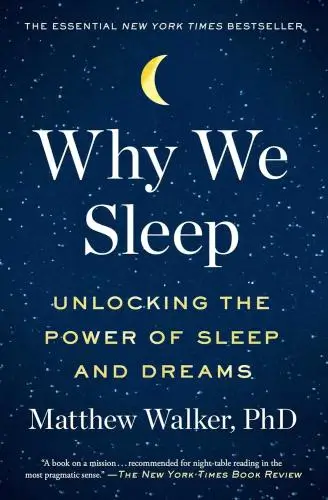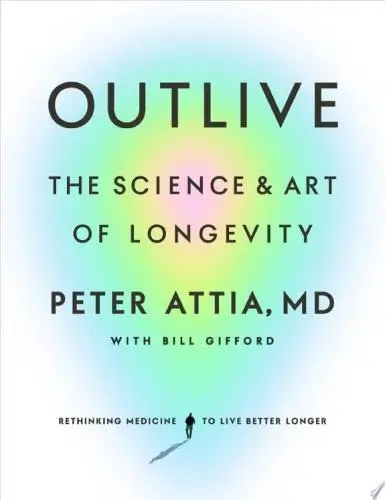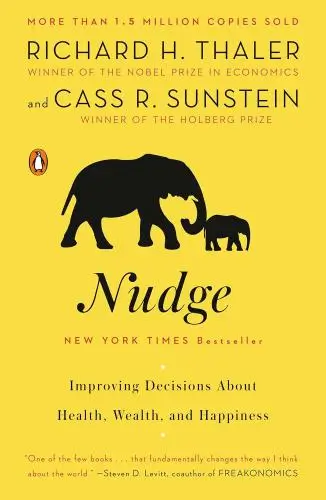
Why We Sleep
Unlocking the Power of Sleep and Dreams
What's it about?
Why We Sleep by Matthew Walker is a fascinating journey into the science of sleep. Walker delves into the importance of sleep for our physical and mental health, revealing how it impacts everything from memory and learning to emotional regulation and disease prevention. He also unpacks the dangers of sleep deprivation and offers practical tips for improving sleep quality. This eye-opening book will change the way you think about your nightly rest and inspire you to prioritize it for a healthier, happier life.
About the Author
Matthew Walker is a British neuroscientist and psychologist recognized for his expertise in sleep research. Author of the best-selling book "Why We Sleep," Walker elucidates the critical importance of sleep on health, brain function, and disease prevention. His work blends scientific insights with accessible explanations, emphasizing sleep's role in overall well-being.
15 Key Ideas of Why We Sleep
- To Sleep...
- Caffeine, Jet Lag, and Melatonin
- Defining & Generating Sleep
- Who Sleeps, How Do We Sleep, and How Much?
- Changes in Sleep Across the Life Span
- The Benefits of Sleep for the Brain
- Sleep Deprivation and the Brain
- REM-Sleep Dreaming
- Dreaming as Overnight Therapy
- Dream Creativity and Dream Control
- Sleep Disorders and Death Caused by No Sleep
- Whats Stopping You from Sleeping?
- Pills vs. Therapy: Hurting and Helping Your Sleep
- Sleep and Society
- A New Vision for Sleep in the Twenty-First Century
Sleep is not just a passive state of rest; it's an essential function that plays a pivotal role in maintaining our health and well-being. Despite its vulnerability, sleep has persisted throughout evolution, indicating its indispensable nature. Recent scientific discoveries have shed light on the myriad benefits sleep offers to both the body and mind.
Consequences of Skimping on Sleep
The repercussions of not getting enough sleep are far-reaching and can be severe. A chronic lack of proper rest heightens the risk for several life-threatening conditions:
- Cancer: There's mounting evidence linking inadequate sleep with increased cancer risk.
- Alzheimer's Disease: Poor sleeping patterns may accelerate brain changes associated with Alzheimer’s disease.
- Diabetes & Cardiovascular Diseases: Insufficient rest can lead to metabolic issues like diabetes and heart-related problems.
- Psychiatric Conditions: Depression, anxiety, and other mental health issues often correlate with poor sleep quality or duration.
- Weight Gain: Hormonal imbalances caused by lack of sleep can increase appetite while decreasing satiety after meals.
Moreover, drowsy driving due to insufficient rest is as dangerous as drunk driving—leading to numerous accidents each year.
The Healing Power of Adequate Sleep
Beyond avoiding negative outcomes, embracing good sleeping habits brings about positive enhancements in various aspects:
- Cognitive Functions: Learning capabilities and memory consolidation are significantly improved during deep stages of slumber.
- Immune System Regulation: Proper rest supports immune defense mechanisms which protect against illness.
Tactics
- Prioritize Quality Sleep: Make getting enough high-quality rest a priority by establishing consistent bedtime routines conducive to relaxation before bed.
- Limit Caffeine Intake: Reduce caffeine consumption especially later in the day as it may interfere with falling asleep easily at night.
- Create Ideal Sleeping Environment: Ensure your bedroom provides optimal conditions for sleeping – comfortable mattress/pillows along with minimal noise & light disturbances.
- Regular Exercise Routine: Engage in regular physical activity but avoid vigorous workouts close to bedtime which might disrupt your ability fall asleep quickly afterwards due heightened alertness levels post-exercise.
- Mindful Eating Habits Before Bedtime : Avoid heavy meals right before bed time since they could cause discomfort making it harder fall asleep comfortably without disruptions caused by indigestion.
By implementing these strategies into your daily routine, you'll be setting yourself up for success—not only will you feel more rested but also enjoy better overall health long-term!
Key Examples/Data
- Sleep deprivation severely impacts health, increasing the risk of cancer, Alzheimer's disease, disrupted blood sugar levels leading to prediabetes, cardiovascular diseases, and psychiatric conditions such as depression and anxiety. It contributes to weight gain and renders dieting ineffective without adequate sleep.
- Sleep deprivation can be fatal. A rare genetic disorder causes progressive insomnia, leading to death after months without sleep. Additionally, drowsy driving causes hundreds of thousands of traffic accidents and fatalities each year, exceeding those caused by alcohol and drugs.
- Science has historically failed to explain why humans need sleep, likening it to a "last great biological mystery." The field struggles to provide a consistent or complete answer, underscoring the complexity and enigmatic nature of sleep.
- An evolutionary perspective reveals the paradox of sleep as a vulnerable state that exposes individuals to predation, yet it persists across the animal kingdom. This paradox prompts questions about sleep's vital functions and the benefits that outweigh its risks.
- Sleep serves multiple functions, benefiting the brain and body. It enhances learning, memory, emotional regulation, immune system function, metabolic balance, appetite regulation, cardiovascular health, and overall physical and mental well-being.
Quotes
- "The shorter your sleep, the shorter your life span. The old maxim 'I'll sleep when I'm dead' is therefore unfortunate. Adopt this mind-set, and you will be dead sooner and the quality of that (shorter) life will be worse."
- "Sleep remained one of the last great biological mysteries. All of the mighty problem-solving methods in science—genetics, molecular biology, and high-powered digital technology—have been unable to unlock the stubborn vault of sleep."
- "No matter what vantage point you take, sleep would appear to be the most foolish of biological phenomena. When you are asleep, you cannot gather food. You cannot socialize. You cannot find a mate and reproduce. You cannot nurture or protect your offspring."
- "Sleep is the single most effective thing we can do to reset our brain and body health each day—Mother Nature's best effort yet at contra-death."
- "The physical and mental impairments caused by one night of bad sleep dwarf those caused by an equivalent absence of food or exercise."
Why We Sleep Summary: Common Questions
Experience Personalized Book Summaries, Today!
Discover a new way to gain knowledge, and save time.
Sign up for our 7-day trial now.
No Credit Card Needed

Similar Books

Do No Harm
Henry Marsh
TOP KNIFE: The Art & Craft of Trauma Surgery
Asher Hirshberg,
Diagnostic Hematology
Norman Beck
2 Weeks to Feeling Great
Gabriela Peacock
The Feeling Great! Wellness Program for Older Adults
Jules C Weiss
Autoimmunity and Autoimmune Disease
David Evered
Outlive
Peter Attia
Nudge
Richard H. Thaler
This is Going to Hurt
Adam Kay
This Is Your Brain on Joy
Earl HenslinTrending Summaries

Peak
Anders Ericsson
Never Split the Difference
Chris Voss
Smart Brevity
Jim VandeHei
The Psychology of Money
Morgan Housel
The First 90 Days
Michael D. Watkins
Atomic Habits
James Clear
Thinking, Fast and Slow
Daniel Kahneman
The Body Keeps the Score
Bessel van der Kolk M.D.
The Power of Regret
Daniel H. Pink
The Compound Effect
Darren HardyNew Books

Forex Trading QuickStart Guide
Troy Noonan
Comprehensive Casebook of Cognitive Therapy
Frank M. Dattilio
The White Night of St. Petersburg
Michel (Prince of Greece)
Demystifying Climate Models
Andrew Gettelman
The Hobbit
J.R.R. Tolkien
The Decision Book
Mikael Krogerus
The Decision Book: 50 Models for Strategic Thinking
Mikael Krogerus
Fichte
Johann Gottlieb Fichte
Do No Harm
Henry Marsh
